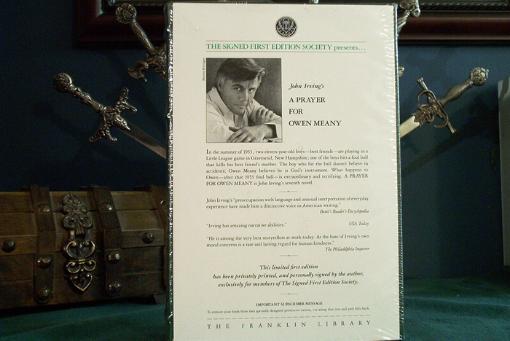Franklin Library John Irving books
A Son of The Circus - signed first edition -1994
A Prayer For Owen Meany - signed first edition - 1989
The Cider House Rules - signed first edition - 1985
Writer John Irving
John Irving, a renowned American novelist and Academy Award-winning screenwriter, was born on March 2, 1942, in Exeter, New Hampshire. Raised in an unconventional household by his mother and stepfather, Irving developed a passion for literature and wrestling from an early age, interests that would later influence his writing. Irving's journey as a writer began at Phillips Exeter Academy, where he excelled as a wrestler and contributed to the school's literary magazine. His early experiences as an athlete, particularly in wrestling, provided themes that would recur in many of his novels. In 1965, Irving graduated from the University of New Hampshire, where he continued to pursue wrestling and honed his skills as a writer. He went on to earn an MFA from the Iowa Writers' Workshop in 1967, where he studied under the guidance of Kurt Vonnegut.
Irving's first novel, Setting Free the Bears, was published in 1968, marking the beginning of a prolific and critically acclaimed literary career. However, it was his fourth novel, The World According to Garp (1978), that catapulted him to international fame. The novel, a darkly comedic exploration of identity, sexuality, and the complexities of life, earned Irving widespread recognition and became a bestseller. Many of Irving's subsequent novels, including The Hotel New Hampshire (1981), A Prayer for Owen Meany (1989), and The Cider House Rules (1985), garnered both commercial success and critical acclaim. A Prayer for Owen Meany, in particular, is often cited as one of Irving's masterpieces, known for its intricate plot, memorable characters, and exploration of profound themes.
Apart from his success in the literary world, John Irving also achieved acclaim as a screenwriter. He adapted his own novel, The Cider House Rules, into a screenplay, which earned him the Academy Award for Best Adapted Screenplay in 2000. Irving's novels are characterized by their richly drawn characters, complex narratives, and exploration of social and moral issues. His storytelling often blends tragedy and humor, tackling themes such as fate, family, and the impact of societal norms on individual lives.
John Irving continues to write and publish novels, leaving an indelible mark on contemporary American literature. His works have been translated into numerous languages, and he remains a celebrated figure in the literary world.
A Prayer For Owen Meany
A Prayer for Owen Meany is a captivating and critically acclaimed novel written by John Irving. Published in 1989, the book is widely regarded as one of Irving's masterpieces, celebrated for its intricate narrative structure, memorable characters, and exploration of profound themes. The novel is set in the fictional town of Gravesend, New Hampshire, and spans several decades, from the 1950s to the 1980s. The story is narrated by John Wheelwright, who reflects on his childhood friend, Owen Meany, and the extraordinary events that shaped their lives.
The narrative begins with a tragic accident in 1953 that alters the course of John and Owen's lives. During a Little League baseball game, Owen Meany hits a foul ball that strikes John's mother, Tabitha Wheelwright, killing her instantly. This event, which Owen believes is fated, becomes a central motif in the novel, influencing the characters' destinies and intertwining their lives in unexpected ways. Owen Meany, a small-statured, charismatic, and outspoken boy with a distinctive high-pitched voice, believes that he is an instrument of God and that he is destined for a heroic purpose. Throughout the novel, Owen's unwavering faith, his quirks, and his profound sense of moral responsibility make him a memorable and enigmatic character.
As the story unfolds, Owen and John navigate the challenges of adolescence, friendship, and the Vietnam War era. Owen's impact on those around him is profound, and his beliefs and actions lead to a series of remarkable events that culminate in a stunning and tragic climax. A Prayer for Owen Meany is celebrated for its exploration of themes such as faith, fate, friendship, and the impact of the individual on the course of history. The novel skillfully weaves together humor, tragedy, and social commentary, creating a narrative that resonates with readers on both intellectual and emotional levels.
John Irving's masterful storytelling, intricate plot structure, and compelling characters contribute to the enduring popularity of A Prayer for Owen Meany. The novel's thought-provoking exploration of life's complexities and the mysteries of fate has cemented its status as a classic in contemporary American literature.
A Son of The Circus
Published in 1994, A Son of The Circus is another ambitious work by Irving, known for his intricate storytelling and complex characters. Set primarily in Bombay (now Mumbai), India, A Son of the Circus follows the life of Dr. Farrokh Daruwalla, an orthopedic surgeon born to Parsi parents. The narrative unfolds against the backdrop of the city's vibrant and diverse culture, offering a rich portrayal of Indian society.
The protagonist, Dr. Daruwalla, is not only a gifted surgeon but also a dwarf, a characteristic that sets him apart in a society where physical appearance often plays a significant role. The novel explores themes of identity, cultural clash, and the complexities of relationships. It delves into the issues of prejudice, religion, and the challenges faced by those who don't fit into societal norms. The narrative is interwoven with various subplots, including a series of murders and a traveling circus featuring a group of misfits. As the story progresses, secrets are revealed, relationships are tested, and the characters confront the impact of their past actions.
John Irving's A Son of the Circus showcases his ability to blend humor, tragedy, and social commentary. The novel is known for its sprawling narrative, rich character development, and exploration of the human condition. While not as universally acclaimed as some of Irving's earlier works like A Prayer for Owen Meany or The World According to Garp, it still offers readers a thought-provoking and immersive experience.
The Cider House Rules
The Cider House Rules was first published in 1985. The book, like many of Irving's works, explores complex moral and social issues, and it is set against the backdrop of an orphanage in rural Maine during the early 20th century. The central character of the novel is Homer Wells, an orphan who grows up under the care of Dr. Wilbur Larch at St. Cloud's orphanage. Dr. Larch not only runs the orphanage but also provides illegal abortions to women in need. Homer becomes an apprentice to Dr. Larch and learns about medicine and obstetrics, but he refuses to perform abortions. This moral conflict forms a crucial part of the novel.
As the story unfolds, Homer leaves the orphanage and experiences life outside its walls for the first time. He works at an apple orchard owned by the Worthington family, the Cider House of the title. There, he becomes entangled in the lives of the Worthingtons, particularly with Wally and Candy, a young couple facing their own challenges. The novel addresses themes such as the morality of abortion, the complexities of familial and romantic relationships, and the search for one's own identity and purpose in life. The characters grapple with moral dilemmas, societal expectations, and the consequences of their choices.
One of the notable aspects of The Cider House Rules is its exploration of the concept of "rules" — both those imposed by society and those created by individuals to navigate their own lives. The narrative is intricately woven, with Irving's characteristic blend of humor, tragedy, and social commentary.
The novel received critical acclaim for its compelling characters, thought-provoking themes, and the author's ability to tackle sensitive subjects with empathy and nuance. In 1999, The Cider House Rules was adapted into a successful film directed by Lasse Hallström, which further brought the story to a wider audience. John Irving's The Cider House Rules stands as a testament to his storytelling prowess and his exploration of complex moral terrain within the context of deeply human and relatable characters.


Comments
Post a Comment
Share your best book review and recommendation